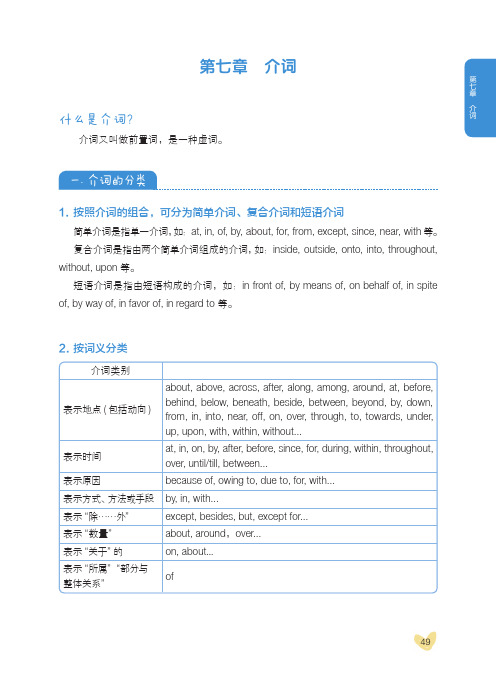图解英语介词含义
英语各种介词的区分和使用(共25张)PPT课件

1. in summer, on September 1st 2. at the cinema, in the hospital 3. write with a pen, go by bus 4. about him, made of wood
时间 地点 方式
其它
CHENLI
4
时间介词
in 年、月、季节及时间段(早、午、晚) on 具体某一天,星期、节日 at 钟点、节日、(一段时间)的起点
在圣诞节期间
by 2016(完成时)
在2016之前
before three days
三天之前
after three days (过去时、一般时) 三天之后
in three days (将来时)
for three days(完成时)
有三天
since three days ago(完成时) 自从三天前
for + 时段
A. in , in B. at ,at C. in, at
CHENLI
9
例题4
Mr. Brown has gone to Canada. He will be back ___ two weeks.
A. for B. after C. in
CHENLI
10
例题5
Our manager came back ___ an hour.
方式介词
1. in 用材料、语言、声音、方式 2. with 用工具、某物 3. by 用方法、交通工具
CHENLI
21
例题1
My mother often go to work ___ bike.
A. in B. on C. by
初中英语语法全解——介词(共21张PPT)

6.across, through, past, over, along, down across表示从物体表面横穿;through表示穿过 空间;past表示从某物的一旁经过;over表示从 一边到另一边;along/down表示“沿着”。 John is going to swim across the river tomorrow. She smiled at him as he walked through the door. Walk down the road.
9.as as可以表示“像、按照”,也可以表示“作为”。 You ought to do as the teacher tells you. 10.against against表示“反对”。 There are 10 votes for him and only 2 against him.
Hale Waihona Puke 5.like like表示“像”。 Her hair is dark brown like mine. 6.with with可以表示“和......一起”,也可以表示“带 有”,还可以表示行为方式等。 She came back with a letter in her hand.
7.without without表示“没有,无”。 He found the place without difficulty. 8.for for可以表示目的,也可以表示原因。 I look after the kids for them.
5.before, after ①before后接时间点,表示“在某个时间之前”。 Must I finish my homework before supper? ②after后节时间点,表示“在某个时间之后”。 I go swimming every day after work.
英语介词用法图解ppt课件

示方式、手段、方法——无形)
• I really can't express my idea in English freely in-
deed.我确实不能用英语流利地表达我的思想。(表示某
种语言用in)
12
• The kilometer is the biggest unit of length in the metric
• "Taking Tiger Mountain by Strategy" is a good opera.
< <智取威虎山> >是—出好戏。(无形)
• The product is separated by distilation into gasoline
and gas oil.这种产品是用蒸馏分离出气油和粗柴油。(表
介词用法图解
1
• 将来时态in...以后, 小处at大处in。
• 有形with无形by,语 言、单位、材料in。
• 特征、方面与方式, 心情成语惯用in。
• 若与数量词连用,混 合使用亦无关。‘
• beyond超出、无、 不能,against靠着, 对与反。
• besides,except分 内外,among之内 along沿。
• 同类比较except,加 for异类记心间。
2
• 原状because of,、owing to、due to表语形容词。
• under后接修、建中,of、from物、化分 • under construction 在。。。之中 • under repair 修建中 • be made of /from 看得见原材料/看不见原材料 • desk is made of wood bridge is made from steel • before、after表一点, ago、later表一段。 • 表时间点,the day before yesterday
《漫画图解——超好记超好用小学英语语法》第七章 介词

第七章 介词 什么是介词?介词又叫做前置词,是一种虚词。
1. 按照介词的组合,可分为简单介词、复合介词和短语介词简单介词是指单一介词,如:at, in, of, by, about, for, from, except, since, near, with等。
复合介词是指由两个简单介词组成的介词,如:inside, outside, onto, into, throughout, without, upon等。
短语介词是指由短语构成的介词,如:in front of, by means of, on behalf of, in spite of, by way of, in favor of, in regard to 等。
2. 按词义分类介词类别表示地点(包括动向)about, above, across, after, along, among, around, at, before, behind, below, beneath, beside, between, beyond, by, down, from, in, into, near, off, on, over, through, to, towards, under, up, upon, with, within, without...表示时间at, in, on, by, after, before, since, for, during, within, throughout, over, until/till, between...表示原因because of, owing to, due to, for, with...表示方式、方法或手段by, in, with...表示“除……外”except, besides, but, except for...表示“数量”about, around,over...表示“关于”的on, about...表示“所属”“部分与整体关系”of1) 表示地点(包括动向)的介词① at, in, on, toat 表示在小地方:I arrive at school at nine every morning. 我每天早上九点到校。
初中全新英语语法——介词(共21张PPT)

*except表示“除......以外”,指“除了......都”,其含 义是“从整体里减去一部分”,着重于“有一部分被排 除在外或不包括在内”,except后的词便是被排除的部 分,常与all,everything,everybody,every day, always等词连用。如:
表示“在......上”的above,over与on
表示“在......下面”的below与under
*①below表示“在......下面”时,指处于比某物低的位置,不一定 在某物的正下方。它在的反义词是above。如:Write your name below the line.
We are below the moon.
表示“在......之间”的among与between
*among表示“在......之间”,指在三者或三者以 上的人或物及物体当中或中间、之间。如:
There is a big lake among the mountains.
*between表示“在......之间”,指在两者之间, 即两个独立的人或物及物体之间。如:
表示时间的at,on与in
*o n 表 示 时 间 用 于 在 某 一 天 或 某 天 的 某 个 时 候 , on后常接某日,星期几、某日或某日的朝夕,某 日的上午、下午或晚上,节日等。如:on Sunday在星期天;on Christmas morning在圣 诞节的早上;on May the first在五月一日;on a cold morning在一个寒冷的早上;on a warm morning in April在四月一个温暖的上午;on a December night在12月的一个夜晚;on the afternoon 在那天下午;on the following night在第二天晚上;on October 1,1949在 1949年10月1日;on New Year’s Day在新年; on New Year’s Eve在除夕;on the morning of the 15th在15日的早上。
介词图解

用法
例句
at
1.at+具体时刻/一天中的某个时间/节日;
2.at+小地点;
3.表示速度、价钱;
4.动作方向;
1. at 7:00, at noon/night/midnight, at Christmas;
2.at school,at the bus stop;
3. at a speed of50kman hour
during
在…期间
What did you do during the summer vacation?
through
自始至终,一直…
We worked through the night.
on
about
关于
on内容是严肃的,有学术性;
about内容较为普通。
Sara is writing a book on science these days.
They are talking about their holidays.
between
among
在…之间
between表示两者之间;表示两者之间;
among表示三者或三者以上之间。
Mina sits between Betty and Mango.
The singer is standing among the fans.
4. He aimed at the bird.
in
1.in+世纪/年代/朝代/年/月/季节/早午晚;
2.in+大地点;
3.方式;
4.in+时间段“…之后”
1.in the 20th century, in the 1950s, in 1989, in summer, in January, in the morning, in one’s thirties;
初中英语语法大全——介词(共24张PPT)

4.before, in front of, behind 这三个词表示“在某物的前/后位置”。before和 in front of都表示在某物前面,可以互换; behind表示在某物后面。 Suddenly, something ran across the road in front of the car.
表示方式的介词
2.in, by, with表示手段和工具
(1)in表示使用某种语言或使用某种材料,语言、材料 名词前不用冠词。 What will you buy with the money? (2)by表示用某种方式手段,名词前不用冠词。 Her shoes were made by hand. (3)with表示是哟用工具、手段等。 We can see with our eyes.
6.across, through, past, over, along, down
across表示从物体表面横穿;through表示穿过空间; past表示从某物的一旁经过;over表示从一边到另一边; along/down表示“沿着”。 John is going to swim across the river tomorrow. She smiled at him as he walked through the door. Walk down the road.
5.beside, by, near, nearby, next to, around
(1)beside和by都表示“在......旁边”,可以互换; near和nearby都表示“在附近”,可以互换。但by和 beside比near和nearby更近。 She sat in a chair near the door. (2)next to 表示“紧靠着,紧挨着”。 He placed his chair next to hers. (3)around表示“环绕,在(......)周围”。 The whole family was sitting around the dinner table.
小学英语趣说图解方位介词

小学英语趣说图解方位介词方位介词是介词比较重要的一个分类。
利用图片记忆方位介词,能帮助学生加深印象,考试时更容易唤醒大脑的深层记忆。
现在就开始记忆吧!1. inin 表示小范围在一个大范围的里面,表示“在某范围之内”,强调两者的包含关系。
如:Beijing is in the north of China.北京在中国的北部。
2. onon 表示一个范围紧挨着另一个范围,表示“两地接壤”,强调两者为相邻关系;还表示“在……上”,并与之相接触。
如:Korea is on the northeast of China.朝鲜在中国的东北面。
He put the computer on the desk.他把电脑放在桌子上。
3. toto 表示一个范围和另一个范围之间隔段距离,表示“在某范围之外”,强调两者是远离关系。
如:Japan is to the east of China.日本位于中国的东边。
4. atat 表示在某地点,强调在某个位置点。
如:I met Mary at the school gate this morning.我今天早上在校门口遇见了玛丽。
5. under 和 belowunder表示“在……的正下方”,指垂直上下。
below表示“在……的下方”,只表示位置低于,但不是在正下方。
如:There is a cat under the table.桌子下面有一只猫。
He saw many hills and rivers below the plane.他看见飞机的下方有许多小山和河流。
6. over 和 aboveover表示“在……垂直的上方”,与under相对;above表示“在……的上方”,指高于某物,但不是正上方,与below相对。
如:She is holding an umbrella over her head. 她撑着一把伞遮头。
An airplane flew above the clouds.一架飞机在云端上面飞行。
英语介词用法图解

这位教师正用一支新笔批改论文。(有形)
• "Taking Tiger Mountain by Strategy" is a good
opera. < <智取威虎山> >是—出好戏。(无形)
• The product is separated by distilation into gasoline
and gas oil.这种产品是用蒸馏分离出气油和粗柴油。(表
怀着.......希望 • in connection with和……有关 • in contact with和……联系 • in addition to除......以外 • in case of倘若,万一 • in conflict with和......冲突 • in force有效的,大批 • in depth彻底地 • in regard to关于 • in the neighborhood of大约、
邻近
• in retrospect回顾,一想起 • in behalf of代表......利益 • in the least一点,丝毫
• in alarm惊慌、担心 • in the opinion of据……见
解
• in the long run从长远说来
• in one's opinion在……看来 • in word口头上 • in a word总之 • in vain无益地,白白地 • in case如果,万一,以防 • in detail详细地 • in haste急急忙忙地 • in conclusion总之 • in spite of尽管 • in other words...换句话说 • in return作为回报 • in the name of以......名义 • be confident in对......有信心 • be interested in对......感兴
重点介词图示

重点介词图示介词(preposition 简写prep.)又称作前置词,表示名词、代词等与句中其他词的关系,在句中不能单独作句子成分。
介词后面一般有名词、代词或相当于名词的其他词类、短语或从句作它的宾语,表示与其他成分的关系。
介词和它的宾语构成介词词组,在句中作状语,表语,补语,定语或介词宾语。
介词可以分为时间介词、地点介词、方式介词、原因介词、数量介词和其他介词。
介词一般用于名词或者代词前面,表示该词与句中其他成分的关系。
介词后面的名词或代词称为介词宾语(如果是人称代词,则要用宾格)。
介词和介词宾语合在一起构成介词短语。
本视频主要是通过图示的方法对几个重点介词的部分用法进行说明。
图示的方法直观明了,更有利于同学们理解并掌握好这几个介词。
附录:介词over1.作“在……上方”、“在……上”(有覆盖、遮蔽之意)解:The sun shines over the earth.2.作“超过”、“在……上”解:He has lived in Beijing over two years.3. 作“通过”、“越过”、“溢出”解:1.I heard the news over the radio.4. 作“遍及”解:The fog spreads over the town.5. 作“对于”、“关于”(有支配、监督、保护、控制等含义)解:There will be much discussion over this problem.介词off1.可用作介词或副词,基本义为“离开”“脱落”“中止”等。
如:I’m afraid I must be off now.恐怕现在我得走了。
Take off your hat in the house. 在室内请脱帽。
We are off for [to] Paris. 我们要动身去巴黎。
He fell off the ladder. 他从梯子上摔下来。
2.用来指时间或距离有多远,与 away 同义,有时可换用。
